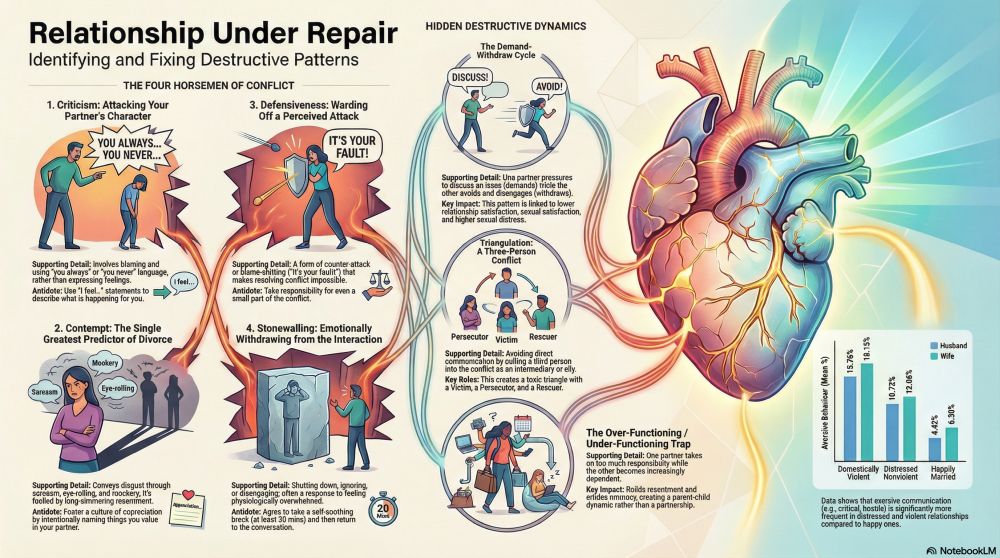The Science of Effective Apologies
🔬 Key Research Finding
Comprehensive 6-component apologies are up to 89% more effective than basic expressions of regret
The Six Essential Components (Ranked by Effectiveness)
Dose-Response: Number of Components vs. Apology Effectiveness
Common Apology Mistakes (Damage to Effectiveness)
Key Finding: Comprehensive Apologies Are Up to 89% More Effective Than Basic Expressions of Regret
Research involving over 26,000 participants demonstrates that apologies significantly improve relationship satisfaction and forgiveness. The most effective apologies contain multiple components and work through three main psychological mechanisms: communicating relationship value, increasing empathy toward the offender, and reducing cognitive dissonance in the victim.
The Six Essential Components (Ranked by Effectiveness)
Most Important:
- Acknowledgment of Responsibility – Taking clear ownership of the wrongdoing.
- Offer of Repair – Proposing concrete ways to make amends.
- Expression of Regret – Showing genuine remorse for the harm caused.
- Explanation of What Went Wrong – Providing context without excuses.
- Declaration of Repentance – Committing to changed behaviour.
- Request for Forgiveness – Asking sincerely to be pardoned.
Research shows a clear dose–response relationship: the more components included, the more effective the apology. Comprehensive six-component apologies yield significantly greater outcomes than single-component apologies.
Major Mistakes to Avoid
Three psychological barriers commonly undermine apology effectiveness:
Low concern for the partner leads to superficial apologies aimed at self-relief rather than genuine repair. Perceived threat to self-image fosters defensiveness and responsibility minimisation. Believing apologies won’t work becomes a self-fulfilling prophecy—half-hearted attempts predictably fail.
The most frequent error is the “apology mismatch”—a disconnect between what victims need (acknowledgment and responsibility) and what offenders prefer to give (explanations or justification).
Gender and Cultural Considerations
Gender differences in apology frequency arise from perception thresholds, not willingness. Women have lower thresholds for perceiving offences but equal willingness to apologise once severity is controlled. Both genders respond positively to the same apology components, although women tend to use more remorse-focused language.
Cultural context strongly shapes apology behaviour. Honour cultures often show reduced willingness to apologise due to reputation concerns. Collectivist cultures emphasise social harmony and hierarchical respect, while individualist cultures prioritise directness and personal accountability.
Optimal Timing and Delivery
The “Better Late Than Early” principle suggests that slightly delayed apologies are often more effective than immediate ones. Victims need time to feel heard and validated before being receptive. However, excessively delayed apologies lose impact—there is an optimal window when emotional readiness aligns with repair.
Non-Verbal Communication Matters
Authentic non-verbal behaviour greatly influences apology success. Sincere apologies feature appropriate eye contact, genuine facial expressions of remorse, and alignment between words and tone. High self-monitors can manage these cues effectively, but authenticity remains the key determinant of long-term repair.
Physiological and Long-Term Benefits
Effective apologies trigger measurable physiological benefits, including 12–15% reductions in heart rate and decreased cardiac stress markers. Neuroimaging studies reveal activation in brain regions linked to empathy and social cognition during apology processing.
Longitudinal studies over two years show that consistent apology–forgiveness cycles sustain relationship satisfaction through increased relational effort and reduced conflict. However, forgiveness without behavioural change can predict relationship decline.
Bottom Line
Scientific evidence confirms that effective apologies combine responsibility, empathy, offers of repair, appropriate timing, and authentic delivery. The strongest apologies integrate multiple components while avoiding defensiveness or minimisation. When executed properly, apologies generate large measurable effects in promoting forgiveness, restoring trust, and maintaining long-term relationship satisfaction.


